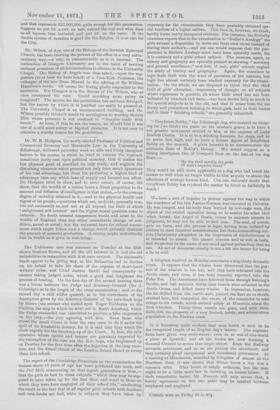Dr. W. B. Hodgson, the newly-elected Professor of Political and
Commercial Economy and Mercantile Law in the University of Edinburgh, delivered yesterday week an able and lively inaugural lecture to his course, in which he tried to remove the reproach sometimes justly cast upon political economy, that it makes the low physical good of mankind its only study, and neglects the -disturbing elements which proceed not only from man's ignorance of his real advantage, but from his preferring a higher kind of advantage than any which laws of supply and demand can affect. Dr. Hodgson tried to show, and to some extent, of course, did show, that the wealth of a nation bears a direct proportion to the amount and diffusion of intelligence in that nation,—to the average degree of morality attained in it,—and to the physical health and vigour of its people,—positions which are, no doubt, generally true, but not necessarily so, and not at all beyond the limit at which enlightened self-interest' and the higher moral qualities cease to coincide. No doubt unusual temperance would add more to the wealth of England than any other conceivable change of con- dition, moral or social ; but the universal taste for refined amuse- ment which might follow such a change would probably diminish the amount of material production. A society might undoubtedly lose in wealth as it grew in well-being.


































 Previous page
Previous page